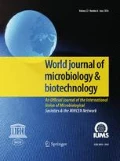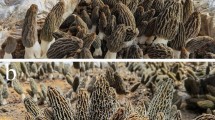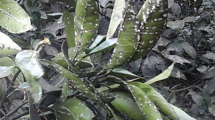Abstract
White mould or stem rot, caused by Sclerotinia sclerotiorum (Lib.) de Bary, is a devastating fungal disease found in major potato cultivation areas worldwide. The aim of this study was to characterize genetic diversity in the S. sclerotiorum population from the main potato producing regions of India by means of morphological (mycelial growth, colony colour, number and distribution pattern of sclerotia) and molecular characteristics, as well as to evaluate the virulence of S. sclerotiorum isolates in potato for the first time. Among the S. sclerotiorum population analyzed, high phenotypic and genotypic diversity were observed. Using all the morphological characteristics, a dendrogram was constructed based on Gower’s similarity coefficient that distributed all the isolates into three clusters at the 0.62 similarity coefficient. Carpogenic germination of apothecia revealed that larger sclerotia produced a greater number of apothecia while smaller sclerotia produced fewer apothecia. Pathogenicity test results revealed that out of 25 isolates, seven were highly aggressive, 14 were moderate and four had low aggressiveness, whilst isolates from Punjab were more pathogenic than those of Uttar Pradesh. Phylogenetic analysis of universal rice primer polymorphism showed high genetic variability within the isolates that grouped all the isolates in three evolutionary lineages in the resulting dendrogram and showed partial relationship with geographical locations of the isolates. Further, the findings suggest the occurrence of higher heterogeneity and genetic diversity among the S. sclerotiorum isolates that indicates the existence of both clonal and sexual reproduction in the pathogen population of potato producing areas in India.







Similar content being viewed by others
References
Abán CL, Taboada G, Spedaletti Y, Aparicio M et al (2018) Molecular, morphological and pathogenic diversity of Sclerotinia sclerotiorum isolates from common bean (Phaseolus vulgaris) fields in Argentina. Plant Pathol 67:1740–1748. https://doi.org/10.1111/ppa.12880
Abawi GS, Grogan RG (1979) Epidemiology of diseases caused by Sclerotinia species. Phytopathology 69:899–904. https://doi.org/10.1094/Phyto-69-899
Aldrich-Wolfe L, Travers S, Nelson BD (2015) Genetic variation of Sclerotinia sclerotiorum from multiple crops in the North Central United States. PLoS One 10(9):e0139188. https://doi.org/10.1371/journal.pone.0139188
Arora RK, Khurana SMP (2004) Major fungal and bacterial diseases of potato and their management. In: Mukerji KG (ed) Fruit and Vegetable Diseases. Kluwer Academic Publishers, Dordrecht, pp 189–231
Atallah ZK, Johnson DA (2004) Development of Sclerotinia stem rot in potato fields in South-Central Washington. Plant Dis 88:419–423. https://doi.org/10.1094/PDIS.2004.88.4.419
Ben-Yephet Y, Genizi A, Siti E (1993) Sclerotial survival and apothecial production by Sclerotinia sclerotiorum following outbreaks of lettuce drop. Phytopathology 83:509–513. https://doi.org/10.1094/phyto-83-509
Boland GJ, Hall R (1987) Epidemiology of white mold of white bean in Ontario. Can J Plant Pathol 9:218–224. https://doi.org/10.1080/07060668709501877
Bolton MD, Thomma BPHJ, Nelson BD (2006) Sclerotinia sclerotiorum (Lib.) de Bary: biology and molecular traits of a cosmopolitan pathogen. Mol Plant Pathol 7:1–16. https://doi.org/10.1111/j.1364-3703.2005.00316.x
Buchwaldt L, Yu FQ, Rimmer SR, Hegedus DD (2003) Resistance to Sclerotinia sclerotiorum in a Chinese Brassica napus cultivar. In: International congress of plant pathology, Christchurch
Derbyshire MC, Denton-Giles M (2016) The control of Sclerotinia stem rot on oilseed rape (Brassica napus): current practices and future opportunities. Plant Pathol 65:859–877. https://doi.org/10.1111/ppa.12517
Dillard HR, Ludwig JW, Hunter JE (1995) Conditioning sclerotia of Sclerotinia sclerotiorum for carpogenic germination. Plant Dis 79:411–415. https://doi.org/10.1094/PD-79-0411
Doyle JJ, Doyle JL (1987) A rapid DNA isolation procedure for small quantities of fresh leaf tissue. Phytochem Bullet 19:11–15
Dutta S, Ghosh PP, Kuiry SP (2009) Stem rot, a new disease of potato in West Bengal, India. Aust Plant Dis Notes 4:80–81. https://doi.org/10.1071/DN09034
FAOSTAT (2019) FAO Statistical datahttp://faostat.fao.orii/
Garg H, Kohn LM, Andrew M, Li H et al (2010) Pathogenicity of morphologically different isolates of Sclerotinia sclerotiorum with Brassica napus and B. juncea genotypes. Eur J Plant Pathol 126:305–315. https://doi.org/10.1007/s10658-009-9547-7
Gill R, Sandhu PS, Sharma P (2015) Morphological and cultural variability among the isolates of Sclerotinia sclerotiorum causing stem rot of rapeseed-mustard. Plant Dis Res 30(1):28–33
Gonzalez N, Godoy-Lutz G, Steadman JR, Higgins R, Eskridg KM (2012) Assessing genetic diversity in the web blight pathogen Thanatephorus cucumeris (anamorph: Rhizoctonia solani) subgroups AG-1-IE and AG-1-IF with molecular markers. J Gen Plant Pathol 78:85–98. https://doi.org/10.1007/s10327-012-0361-2
Hammond CN, Cummings TF, Johnson DA (2008) Deposition of ascospores of Sclerotinia sclerotiorum in and near potato fields and the potential to impact efficacy of a biocontrol agent in the Columbia basin. Am J Potato Res 85:353–360. https://doi.org/10.1007/s12230-008-9029-z
Irani H, Heydari A, Javan-Nikkhah M, İbrahimov A (2011) Pathogenicity variation and mycelial compatibility groups in Sclerotinia sclerotiorum. J Plant Prot Res 51:329–336. https://doi.org/10.2478/v10045-011-0054-4
Kang H, Park DS, Go SJ (2002) Fingerprinting of diverse genomes using PCR with universal rice primers generated from repetitive sequence of Korean weedy rice. Mol Cells 13:281–287
Kull LS, Vuong TD, Powers KS et al (2003) Evaluation of three resistance screening methods using six Sclerotinia sclerotiorum isolates and three entries of each soybean and dry bean. Plant Dis 87:1471–1476. https://doi.org/10.1094/PDIS.2003.87.12.1471
Kull LS, Pedersen WL, Palmquist D, Hartman GL (2004) Mycelial compatibility grouping and aggressiveness of Sclerotinia sclerotiorum. Plant Dis 88:325–332. https://doi.org/10.1094/PDIS.2004.88.4.325
Kumar P, Rathi AS, Singh JK et al (2016) Cultural, morphological and Pathogenic diversity analysis of Sclerotinia sclerotiorum causing Sclerotinia rot Indian mustard. Indian J Ecol 43(1):463–472
Lal M (2019) Major soil and tuber borne diseases in potato and their management. In: Bhatnagar A, Lal M, Raghavendra KV, Singh D (eds) Advancement in potato production technology and its future prospects, training manual. ICAR-CPRI Regional Station, Shimla, pp 103–113
Lal M, Chaudhary S, Yadav S et al (2019) Development of spray schedules for management of late blight of potato using new chemicals. J Mycol Pl Pathol 49:405–412
Lehner MS, Paula JTJ, Hora JBT et al (2015) Low genetic variability in Sclerotinia sclerotiorum populations from common bean fields in Minas Gerais State, Brazil, at regional, local and micro-scales. Plant Pathol 64:921–931. https://doi.org/10.1111/ppa.12322
Leyronas C, Bardin M, Berthier K, Duffaud M et al (2018) Assessing the phenotyping and genotyping diversity of Sclerotinia sclerotiorum in France. Eur J Plant Pathol 152:933–944. https://doi.org/10.1007/s10658-018-1493-9
Li CX, Liu SY, Sivasithamparam K, Barbetti MJ (2009) New sources of resistance to Sclerotinia stem rot caused by Sclerotinia sclerotiorum in Chinese and Australian Brassica napus and B. juncea germplasms screened under Western Australian conditions. Australas Plant Pathol 38(2):149–152. https://doi.org/10.1071/AP08087
Lujan P, Sanogo S, Puppala N, Randall J (2016) Factors affecting mycelium pigmentation and pathogenicity of Sclerotinia sclerotiorum on Valencia peanut. Can J Plant Sci 96:461–473. https://doi.org/10.1139/cjps-2015-0258
Mandal AK, Dubey SC (2012) Genetic diversity analysis of Sclerotinia sclerotiorum causing stem rot in chickpea using RAPD, ITS-RFLP, ITS sequencing and mycelial compatibility grouping. World J Microbiol Biotechnol 28:1849–1855. https://doi.org/10.1007/s11274-011-0981-2
Mann MB, Spadari CC, Feltrin T et al (2014) Genetic variability of Bipolaris sorokiniana isolates using URP-PCR. Trop Plant Pathol 39:163–171. https://doi.org/10.1590/S1982-56762014000200007
Materatski P, Varanda C, Carvalho T et al (2019) Effect of long-term fungicide applications on virulence and diversity of Colletotrichum spp. associated to Olive anthracnose. Plants (Basel) 8(9):311. https://doi.org/10.3390/plants8090311
McDonald BA, Linde C (2002) Pathogen population genetics, evolutionary potential and durable resistance. Ann Rev Phytopathol 40:349–379. https://doi.org/10.1146/annurev.phyto.40.120501.101443
Morrall RAA, Dueck J (1982) Epidemiology of Sclerotinia stem rot of rapeseed in Saskatchewan. Can J Plant Pathol 4:161–168. https://doi.org/10.1080/07060668209501319
Morrall RAA, Duczek LT, Sheard JW (1972) Variations and correlations within and between morphology, pathogenicity and pectolytic enzyme activity in Sclerotinia from Saskatchewan. Can J Bot 50:767–786. https://doi.org/10.1139/b72-095
Mylchreest SJ, Wheeler BEJ (1987) A method for inducing apothecia from sclerotia of Sclerotinia sclerotiorum. Plant Pathol 36:16–20. https://doi.org/10.1111/j.1365-3059.1987.tb02172.x
Nahar MS, Nahar H, Alam MJ et al (2019) Variation in isolates of Sclerotinia sclerotiorum (Lib.) de Bary causing white mold disease in Bangladesh crops. Crop Prot 124:104849. https://doi.org/10.1016/j.croppro.2019.104849
Ojaghian MR, Zhang J, Zhang F, Qiu W, Li X, Xie G, Zhu S (2016) Early detection of white mold caused by Sclerotinia sclerotiorum in potato fields using real-time PCR. Mycol Prog 15:959–965. https://doi.org/10.1007/s11557-016-1222-8
Rathi AS, Jattan M, Punia R, Singh S, Kumar P, Avtar R (2018) Morphological and molecular diversity of Sclerotinia sclerotiorum infecting Indian mustard. Indian Phytopathol 71:407–413. https://doi.org/10.1007/s42360-018-0054-7
Rohlf FJ (1998) NTSYS-pc: numerical taxonomy and multivariate analysis system. Version 2.02. Exeter Software, Setauket
Sanogo S, Puppala N (2007) Characterization of a darkly pigmented mycelial isolate of Sclerotina sclerotiorum of Valencia peanut in New Mexico. Plant Dis 91:1077–1082. https://doi.org/10.1094/PDIS-91-9-1077
Schwartz HF, Steadman JR (1977) Factors affecting Sclerotium populations of, and apothecium production by Sclerotinia sclerotiorum. Phytopathology 68:383–388. https://doi.org/10.1094/Phyto-68-383
Selvaraj VK, Ponnusamy RK, Sevugaperumal N, Aiyanathan EA (2015) Developmental biology and infection cycle of Sclerotinia sclerotiorum causing stem rot of carnation in India. Afr J Microbiol Res 9:2328–2336. https://doi.org/10.5897/AJMR2015.7690
Sharma P, Meena PD, Verma PR et al (2015) Sclerotinia sclerotiorum (Lib.) de Bary causing Sclerotinia rot in oilseed Brassica: A review. J Oilseed Bras 6:1–44
Sharma P, Samkumar A, Rao M, Singh VV et al (2018) Genetic diversity studies based on morphological variability, pathogenicity and molecular phylogeny of the Sclerotinia sclerotiorum population from Indian Mustard (Brassica juncea). Front Microbiol 9:1169. https://doi.org/10.3389/fmicb.2018.01169
Sirjusingh C, Kohn LM (2001) Characterization of microsatellites in the fungal plant pathogens, Sclerotinia sclerotiorum. Mol Ecol Notes 1:267–269. https://doi.org/10.1046/j.1471-8278.2001.00102.x
Smith EA, Boland GJ (1989) A reliable method for the production and maintenance of germinated sclerotia of Sclerotinia sclerotiorum. Can J Plant Pathol 11:45–48. https://doi.org/10.1080/07060668909501145
Winton LM, Krohn AL, Leiner RH (2006) Genetic diversity of Sclerotinia species from Alaskan vegetable crops. Can J Plant Pathol 28:426–434. https://doi.org/10.1080/07060660609507316
Ziman L, Jedryezka M, Srobarova A (1998) Relationship between morphological and biochemical characteristics of Sclerotinia sclerotiorum isolates and their aggressivity. J Plant Dis Protect 105:283–288
Acknowledgements
The authors are grateful to Director, ICAR- Central Potato Research Institute, Shimla HP for providing research facilities to conduct this study.
Author information
Authors and Affiliations
Contributions
SC and ML collected isolates from diseased samples and along with HT performed the morphological characterization and pathogenicity evaluation. SC and ML carried out molecular characterization and wrote the paper. SS carried out clustering of fingerprinting and morphological data. MK, SS, and SKC edited the manuscript.
Corresponding author
Ethics declarations
Conflict of interest
The authors declared no conflict of interest.
Ethical approval
This article does not contain any studies with animals performed by any of the authors.
Additional information
Publisher’s Note
Springer Nature remains neutral with regard to jurisdictional claims in published maps and institutional affiliations.
Electronic supplementary material
Below is the link to the electronic supplementary material.
Rights and permissions
About this article
Cite this article
Chaudhary, S., Lal, M., Sagar, S. et al. Genetic diversity studies based on morpho-pathological and molecular variability of the Sclerotinia sclerotiorum population infecting potato (Solanum tuberosum L.). World J Microbiol Biotechnol 36, 177 (2020). https://doi.org/10.1007/s11274-020-02952-w
Received:
Accepted:
Published:
DOI: https://doi.org/10.1007/s11274-020-02952-w




